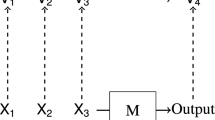Abstract
I respond to the critical comments by Randolph Clarke, Alfred Mele, and Derk Pereboom on my book Causation and Free Will. I discuss some features of the view that our freedom is exclusively based on actual causes, including the role played in it by absences of reasons, absence causation, modal facts, and finally some additional thoughts on how a compatibilist can respond to the manipulation argument for incompatibilism.
Similar content being viewed by others
Notes
Clarke (personal communication) notes that this still doesn’t capture the idea that I’m sensitive to reasons because I’m sensitive to the presence of your foot (which I am because I’m able to recognize and respond to the presence of your foot, although I don’t in the actual case). But it seems to me unclear that we really want to say this. Plus, it clashes with the lesson I draw from Frankfurt, since the presence of your foot doesn’t play an actual causal role.
I have in mind the account of quasi-causation offered in his book (Dowe 2000, chapter 6). In fact, David Lewis’s view (Lewis 2004, the other account mentioned by Clarke) is also an example of this. While Lewis’s account of direct causation requires strict counterfactual dependence, Lewis takes causation to be the ancestral of direct causation, which allows for causation of overdetermined outcomes in some cases.
Also, some causal claims that I make in the book are somewhat tentative. In particular, in chapter 2 I note that, if I’m wrong about the causal structure in Accomplice, the relevant claims about responsibility may have to be revised as a result (pp. 83–84). So, at the end of the day, I’m not completely wedded to every causal claim I make in the book. My most central commitment is to the idea that the responsibility facts are grounded in the causal facts, whatever these turn out to be.
In turn, notice that it’s also not uncommon to think that counterfactual facts are themselves grounded in actual facts—this is “actualism” about modality; a view according to which modality is ultimately reducible to what’s actual.
I also discuss this point in Sartorio (forthcoming).
For a description of the Diana case see Mele’s contribution in this issue.
Referenced in Pereboom’s contribution in this issue and in Björnsson and Pereboom (2016).
It would also mean that we couldn’t use the diffusion of responsibility effect that I used as a debunking explanation of our intuitions about the Diana case. But I take this to be less of a problem for me. As I explained in Chapter 5, the debunking explanation that I provided for the Diana case was merely intended as an exploratory thought. The way I see the dialectic, compatibilists don’t actually need to explain why or how the non-responsibility intuition about that kind of case arises. As I noted in my response to Mele, all I think the compatibilist needs to do is provide reason to doubt one of the premises in (the best formulation of) the manipulation argument; offering a debunking explanation isn’t needed until the burden of proof has been shifted back to the compatibilist.
References
Beebee, H. (2004). Causing and Nothingness. In H. Collins & L. Paul (Eds.), Causation and counterfactuals (pp. 291–308). Cambridge: MIT Press.
Björnsson, G., & Pereboom, D. (2016). Traditional and experimental approaches to free will and moral responsibility. In J. Sytsma & W. Buckwalter (Eds.), The Blackwell companion to experimental philosophy (pp. 142–157). Hoboken: Wiley Blackwell.
Dowe, P. (2000). Physical causation. Cambridge: Cambridge University Press.
Lewis, D. (1986). Causal explanation. In D. Lewis (Ed.), Philosophical papers II (pp. 214–240). Oxford: Oxford University Press.
Lewis, D. (2004). Void and object. In H. Collins & L. Paul (Eds.), Causation and counterfactuals (pp. 277–290). Cambridge: MIT Press.
Sartorio, C. (Forthcoming). Replies to critics. Symposium on Causation and Free Will, Teorema.
Acknowledgments
Thanks to Randy Clarke, Juan Comesaña, Michael McKenna, Al Mele, and Derk Pereboom for comments on a draft of these replies. I am very grateful to my critics for taking their time to think about the ideas in the book and for their insightful comments.
Author information
Authors and Affiliations
Corresponding author
Rights and permissions
About this article
Cite this article
Sartorio, C. Replies to critics. Philos Stud 175, 1545–1556 (2018). https://doi.org/10.1007/s11098-018-1060-4
Published:
Issue Date:
DOI: https://doi.org/10.1007/s11098-018-1060-4



